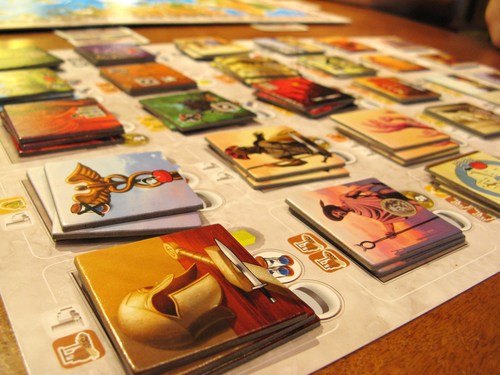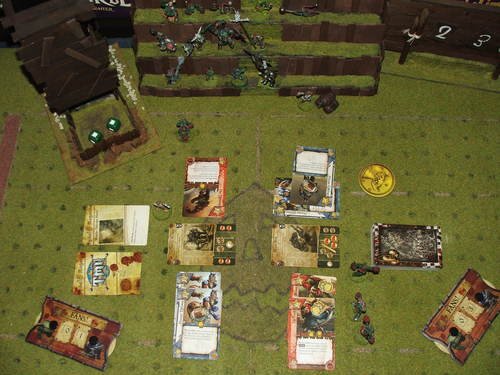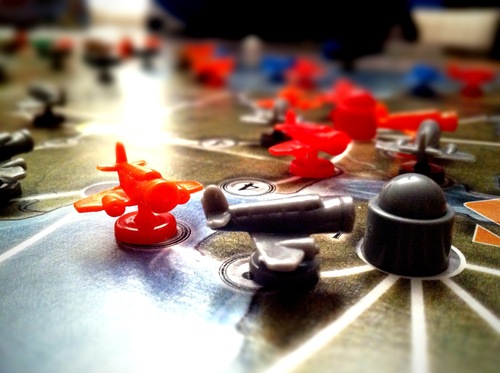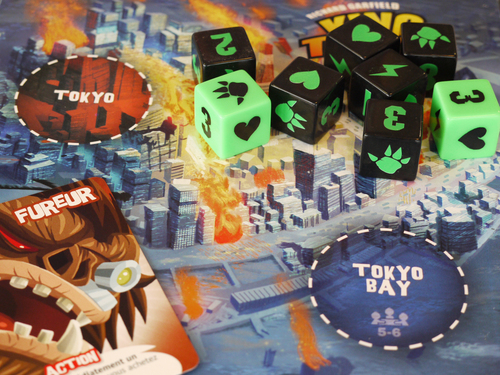
5.) Olympos. A ninety-minute civilization/conquest game is practically impossible to manage, but Olympos does so quite well. Its “time” turn-making mechanic (lifted from games like Thebes) gives the game a modular feel – clever players can figure out how to set up their plays so as to take multiple turns in a row and gain advantage that way, but then again sometimes going for a big single turn is the right play. The scarce resources force you to fight other players for tactical advantage (particularly when it comes to the Zeus heads which give you religious bonuses at the right time – and timing the gain of these bonuses is another aspect of the game that lends itself to strategic thinking). Olympos is simply a well-designed area control game with a lot of nifty tweaks to it, and a good fight-it-out area control game is always worth my time.

4.) Blood Bowl Team Manager. Oldschool nerds are all familiar with Blood Bowl – Games Workshop’s last truly funny property since Warhammer 40K and even Warhammer Fantasy seem determined to suck all the joy out of their respective settings – but this is a different twist on the idea, abstracting the idea of football with elves and dwarves and orcs into a season at a time, and doing so quite successfully. Sometimes a good game is more about communication of its theme, and BBTM is an excellent example of this: it’s a game that’s about giving you the feel of playing a whole lot of Blood Bowl without actually having to play a whole lot of Blood Bowl. And it’s funny, with some clever mechanics (the mandatory cheating is my favourite) and nice art.

3.) Airlines Europe. Last time we discussed board games, I was talking about 18XX games, which are about creation of rail networks and manipulation of the stock market. Airlines Europe is an entry-level stock game, and sort of the equivalent to 18XX in stock manipulation in the way that, say, Ticket To Ride is sort of the equivalent to 18XX in route building. (Both games were designed by Alan R. Moon, so this is doubtless no coincidence.) The result is a fun game that isn’t too time-consuming and is very enjoyable for new players, but offers quite a bit of fun for experienced boardgamers as well. My only criticism of the game is that the route-building aspect of the game is too wide open for experienced players, but the recent Flight Ban expansion (which one should soon be able to get very cheaply online) seems to fix that quite nicely.

2.) Eclipse. A stupendous achievement and naturally short-printed in its initial run, so you’ll have trouble getting a copy (and even then this one is ‘spensive). But it is well worth the effort to pick up, as this game is simply superb. Boardgame versions of Master of Orion have been a holy grail of design in the hobby for years, and mostly they fall into “light fun, but not meaty enough” games like Terra Prime or Ascending Empires, or “I hope you like LOTS AND LOTS OF FLOWCHARTS” games like Throneworld. Eclipse straddles the boundary between these two neatly: it is a game that only takes half an hour per player, but remains a true 4X game (explore, expand, exploit, exterminate) and has so much customizability that a big part of the game is designing your own spaceships. It has a comprehensive tech tree research system, a brilliant economic engine, a solid combat system, rules for diplomacy, a half dozen variant alien races, and best of all the rules are simple enough that they will not overwhelm players who want to avoid the aforementioned flowcharts: the action-selection mechanic the game uses is inspired. Really, every single aspect of this game’s design is inspired, and the production value is excellent. There is simply nothing that is bad about this game.

1.) King of Tokyo. This one was designed by Richard “Magic: The Gathering” Garfield, and Garfield is a designer who has only gotten better over the years. The game is best described as “Yahtzee, except you are a giant monster.” Of course it’s more than that, as roll-and-keep dice games have gotten more sophisticated over the years, with Roll Through The Ages being the most complex of the genre and one of the most popular. But where Roll Through The Ages offers players a complex set of upgrade options, King of Tokyo offers wilder and more chaotic gameplay – but also more tactical than RTTA, since that game is more of a point-scoring race with some minor options for interaction while KoT is all about beating the other players up, as a giant monster game should be. Every turn is filled with important decisions: do you chase points or try to beat up other monsters? Heal yourself, or save up to buy upgrade cards to make yourself a more efficient giant killing machine? (Or, if you like, a Friend to Children Everywhere, as the game will offer you that option.) It plays fast and furious, is tons of fun, only takes about twenty to thirty minutes, and also this is a game where you are giant monsters beating each other up. Nothing else comes even close to being the best game of 2011 for me.
Other games in 2011 that were good: A Few Acres of Snow, Pastiche, City Tycoon, Ankh-Morpork, Skull and Roses.
Other games in 2011 that were not so good: The Star Trek TNG Deckbuilding Game, Quarriors, Dungeons and Dragons: Wrath of Ashardalon, Urban Sprawl, Cargo Noir.
Most welcome reprint in 2011: Montage.


Related Articles
32 users responded in this post
I REALLY want to play Eclipse, but I’ve yet to be in a room with a copy of it, and of course I totally agree that King of Tokyo was the most fun I had with anything new this year.
I will say I enjoyed Cargo Noir though, but that could be purely because I enjoy pretending to be the Chinese mafia.
I actually like Urban Sprawl quite a lot, although my plays so far have been limited to two players. It is quite swingy, but I think it’s long enough to help counter some swinginess withe careful play, and I think (like Dominant Species) it doesn’t suffer too much from down time and is quite engaging. It’s a truism, but perhaps in this case even more than most: I can easily see why Urban Sprawl might not be for all tastes — it is long, and can be quite swingy/chaotic.
My problem with Urban Sprawl isn’t the swinginess of it. My problem with Urban Sprawl is that there is far too much downtime, contrary to your suggestion. You can’t do any real planning on your opponents’ turns because the board and available cards change too greatly, and your turn consists of doing your moves, then taking five minutes while the game essentially plays itself: “okay, now these players get bonuses, now this thing happens, more bonuses, whee!”
It’s better than Alien Frontiers, which has a lot of the same problems, but only slightly.
Um. Not to denigrate Eclipse, which is indeed the bomb, but no mention at all of Twilight Imperium, which also avoids the “not meaty enough” and “I hope you like flowcharts” question, and while it is arguably worse than Eclipse when it comes to designing your own ships and organically building the galaxy during play, it is arguably superior when it comes to both strategic depth and to your galactic empires building infrastructure (so you feel like you have a real empire, with space docks and orbital defenses and Sardaukar ground troops and everything).
Not to mention the fact that Twilight Imperium is cheaper, despite being cheaper has considerably flashier and better-looking game pieces than Eclipse, is readily available, and has a bunch of expansions?
Got a copy of Blood Bowl Team Manager and have played once so far… I was Dwarves and got crushed by an evil team, think it was Scravens. They had a card that gave the team fans every time they lost a matchup, which seemed crazy overpowered because it made it impossible to catch up fans-wise. Hmph. Want to try it again with 3-4 players and not playing Dwarves. 🙂
Twilight Imperium doesn’t have flowcharts, but it does have innumerable little cards which upgrade things for you which are hard to read, which is nearly as problematic. One of the reasons Eclipse is so good is that its design allows you to see research upgrades on the other side of the board clearly and easily, for example. TI doesn’t do that.
Also, a six-player game of Eclipse takes three hours. A six-player game of TI takes at least six and usually eight hours. That makes a difference.
*Skavens
@MGK
This is true, and those are legitimate critiques. I just thought it was weird that you mentioned Eclipse in a comparative context without even bringing up TI, which is sort of the 800-pound gorilla of the “can we make Master of Orion, but in board game form?” market niche, and which is Eclipses clearest and most obvious competition.
Having said that, yeah, Eclipse’s much much lower playing time is a big advantage. I approach my 4x boardgames (and my 18XX boardgames, come to think of it) the same way I approach my 4x computer games, where if it takes less than eight hours I feel as if I have done something very, very wrong.
Not everyone does that, tho, and “sure, pull up a chair. Uh… you didn’t have any plans for the rest of the day, right?” can turn off a lot of people. Makes scheduling game slots at conventions hell on wheels, too.
My roommate and I got Quarriors. I admit, it feels like something in the game is lacking, but I can’t figure out what. And given the fact that I’ve won every time we’ve played, it has grown on me.
I am upset to hear the D&D board games aren’t panning out. I was really rooting for them, although I guess I should have known better after 4E rolled out as such a mushy disappointment.
4E already is a boardgame. (Seriously, it is. Try playing without a grid and tokens, bare minimum, and see how far you get.) So I’m not really surprised that boardgame versions of a boardgame aren’t really panning out.
9th level so far, with my current low-magic, filled-with-curses, RP-heavy Ravenloft game that only busts out a battlemap for major boss battles. 😉
Anyway, Wrath of Ashardalon wasn’t very compelling, but I have been surprisingly impressed with Legend of Drizzt, which adds some more interesting elements to the gameplay.
(Above post seems to have dropped the quote I was responding to: “4E already is a boardgame. (Seriously, it is. Try playing without a grid and tokens, bare minimum, and see how far you get.)” My apologies for the HTMLFail!)
One presumes we’re counting 7 Wonders as a 2010 release, because otherwise: what the hell, no 7 Wonders?
The only truly 2011 games I picked up in 2011 were Mansions of Madness, The Resitstance, and Ninjato. I haven’t played any of them nearly enough yet, but I suspect I will tire of MoM long before twice-running all the scenarios. Ninjato is an excellent addition to the four-player worker placement genre, adding a devious push-your-luck element that makes for some pretty tense decision making. Plus: big wooden throwing stars!
Damn you, though. I have already resigned myself to dropping $75 on Eclipse when it gets restocked. I’ve had my eye on both Olympos and Pastiche for a while, but I haven’t yet been able to justify the >$40 price tag for games I wasn’t sure about, given that the last two months has already seen purchases of Ninjato, Ora and Labora, Dominion: Intrigue, the Kingsburg expansion, and the Anniversary Edition of Puerto Rico. But everything positive thing I see about Olympos and Pastiche tips the balances one little bit more….
I’ve already picked up King of Tokyo and will have Eclipse in a couple of weeks (I’m picking it up from a con.) We seem to have similar tastes in games. Really want to play Airlines Europe (as I played Union Pacific years ago and want something similar) and I’ve heard good things about Olympos.
Have you tried Sentinels of the Multiverse or are you just not that into co-ops?
I was so enthused back when I first heard about 40k, and then so dismayed when I found out that they actually took the whole thing seriously.
I have a brother who loves monster movies and gets together with his friends to play Risk whenever they get the chance, so I get the feeling he’ll get a kick out of King of Tokyo. I might just have to order it for his birthday in May.
Why no love of Quarriors? Our group just got into it and we’re having a lot of fun with it. Also, seconds on the 7 Wonders lack of love.
Stephen McNeil, MoM gets real tiring fast. The DM is basically just being a dick without telling much story, and he’s vastly overpowered (the scenario, I think it’s 3 or 4, the one in the house, where you can sac cultists to get a big monster, and you basically spawn 3 cultists a turn?) and i say that as the guy who usually enjoyed being the DM there.
And as I’m someone who started on 4th Ed, I like it. The game is simple to understand without getting stupidly pointless, and anyone can join and play, unlike the time I played 3rd (though maybe my friend was just a bad DM). Course, I’m sure I’ll hate the eventual 5th edition.
Out of curiosity, how much hand-waving and house-ruling does this involve? Every time I’ve seen a group try going without minis and a map, the vast number of powers that are movement-dependent in some way, as well as the fact that the entire system is designed around the assumption you’re going to be measuring out spaces, always forces them into a battlemap. Especially if you’re playing something like a Wizard or a Warlock, or trying to use Artillery-type NPCs.
Minis and a mat makes a boardgame? Damn, D&D has been a boardgame since the 80s.
I’ve enjoyed Wrath of Ashardalon as a pretty quick, cooperative dungeoncrawl. For my group, it’s a semi-D&D experience that we can do in an hour.
The boardgame that has caught my group’s attention lately is Risk Legacy- a fast version of Risk (get 4 victory points instead of the old wipe everyone out) with permanent changes. Win a game, place a major city or name a continent, gaining a benefit in later games.
The D&D boardgames are very much in the ‘Beer And Pretzels’ (Thereby making me the first person to use that term for nerdproduct in the better part of a decade) school of gaming.
I think they’re a lot of fun to play with friends but I can see how someone who’s a ‘boardgame guy’ might be disappointed.
“Out of curiosity, how much hand-waving and house-ruling does this involve?”
Probably the same amount of hand-waving and house-ruling that comes into play in ANY edition of D&D where the players aren’t charting their positioning and movement on some sort of map.
“How far away is the nearest goblin again? Can I get over there and hit him with my sword in one turn?”
“Uh…sure, why not.”
“Oooh! Can I hit all of them with a fireball?”
“Uhhh…yyyyno. You can hit, um, four of them, but not the rest.”
“But you just said he could run over there and hit that one with his sword! If they’re that close together, I ought to be able to hit them all, right?”
Quick, which edition am I talking about here?
***
Moving on from burgeoning edition wars, I’d like to second Scott up there and call out Risk: Legacy as the boardgame I never knew I needed but now unconditionally love to pieces. Even if you don’t like Risk you really owe it to yourself to at least play a game or two of this. It has so many wonderful features, both of the “fun toys to play with” variety as well as the “wow, this game was designed really well” variety that I couldn’t begin to list them all without hitting the character limit in the post box. MGK, have you had a chance to try this one yet? I’d love to hear your thoughts on it.
3e and 4e were the first versions of D&D not to require you understand wargame notation and unspoken concepts from the early 70’s.
For some reason, this evoked complaints of their resemblence to boardgames.
Dungeons & Dragons from the very start has always had an obsession with finicky and precise measurements. This is a game that started out as an offshoot of a wargame, where the writers have always been punctilious about ensuring that one measure the precise cubic volume of their spells’ areas of effect and track how many minutes various effects last and know how far one can run in a combat round and whatnot. The earliest editions, the ones closest to its wargame roots, even measured combat movement in inches if I recall correctly.
If those earlier editions seem “less handwavey” when it comes to abstracting out the combat, it’s only due to decades of ingrained “houserules and handwaving” that have become so ingrained and unspoken amongst those that play them that they don’t register as such when people think about them, much like how Monopoly as played strictly by the rules is a much different (if no more enjoyable) beast than Monopoly as people typically play it.
That’s not to say that I don’t think 4th Edition D&D wasn’t influenced at all by boardgames and boardgame design, just like I think it’s silly to claim that it carries no influence from World of Warcraft. “4E is a boardgame/is WoW/is whatever” is rarely employed as more than a shallow edition warrior’s rallying cry, however. It’s rare that anyone stops to examine what exactly 4th Edition might have drawn from these sources, why, or how it employs them in any real, critical light. Influenced by board games? Almost certainly. Calling it a board game straight up, however, is disingenuous.
I would never have called 4e a board game. I’d call it a table-top MMORPG, whereas the D&D boardgames are distinct and limited enough to be boardgames and the older versions of D&D are less tied into a distinct set of choices.
For example: in 4e, a player has a set number of actions that may be taken in combat, each of which is tied to a power (I’m simplifying), with the options increasing with levels. It still allows for some non-power based actions outside of combat and character interaction. In the D&D boardgames, there is no characterization to speak of, and the actions on each turn are extremely limited and happen in a set order. In older D&D, the descriptions of what a character wants to attempt can be nearly infinite, depending on the player and the DM’s leniency, thus separating it from either board or MMORP games.
“Out of curiosity, how much hand-waving and house-ruling does this involve?”
As Kai points out, not much more (in terms of movement and location issues) than I had back when I was playing 2nd Ed without a battlemap. The only real simplifying I did along these lines was to say that flanking doesn’t involve getting on opposite sides of an enemy, just involves that enemy being engaged by multiple PCs. I’ve got one or two other house-rules in these combats, but those are mainly just to speed things up (stuff like taking average damage instead of rolling, etc.) It is certainly true the system is designed with a battlemap in mind, but it certainly doesn’t fall to pieces in its absence.
Anyway, my friends and I have had a lot of recent fun with the Legend of Drizzt. (Even if I’m the only one who actually gets all the references to the characters and the books.) My only real complaint is that the adventures tend to be too easy for a skilled party (especially since Legend of Drizzt ups the PC power level a bit, and Drizzt himself is pretty directly more powerful than other characters.) On the other hand, it looks like it won’t be too difficult to design custom adventures for our group (even mixing and matching pieces from the different games), which might provide a good solution to that.
I remember taking several movement-based powers in 4E that would have seemed very lame in a hand-waving-the-battlemap type of gameplay. I guess when you don’t use a battlemap people often don’t take those powers?
King of Tokyo is fun, but I debate that there are lots of decisions to make. After several plays it seemed the decisions were obvious, and it rarely made sense to stay in Tokyo after getting hit (unless it’s a two player game or something).
I hope to try out Eclipse and Airlines: Europe, heard good things. Nice tip about the expansion.
MGK: One-sentence review of Ankh-Morpork? (Most of the reviews I’ve read/seen are by people unfamiliar with the books; I’d love to see what a Discworld fan and serious gamer thinks.)
You didn’t like Quarriors?
I thought that game was insanely fun and extremely easy to learn. It isn’t overly complex and most games finish up rather quick allowing for multiple plays a night as opposed to some games that are intentionally long that can make time drag in a negative way
I took my copy of Quarriors with me when I visited my sister’s family for Thanksgiving, and it was a huge hit with my nieces. So I gave them a copy for Christmas, which helped cement my standing as Favorite Uncle.
You can play eclipse online now at http://www.vassalengine.org I haven’t tried it yet but there are a ton of games there and I’d be happy to show anyone the ones I know how to play (arkham horror, ghost stories, shadows over camelot, roma, jambo, I’m sure a few more) there are also sites like zuntzu.com and boardgamearena.com and yucata.de that have a ton of games too.
[…] MightyGodKing’s end of the year post was tantalizing and interesting, selecting many picks mentioned by others — Olympos, Blood Bowl Team Manager, Eclipse, King of Tokyo, and Airlines Europe. I liked it for simplicity and good writing– he explains what he liked and why he liked it in no uncertain terms. […]
[…] I much prefer the new Sid Meier’s Civilization boardgame (the one by Fantasy Flight) for when I want a proper civ-game experience. It is, to be sure, a bit clunky in terms of its rules because it tries to adapt virtually every aspect of the computer game series into a boardgame, but: it has a good tech-tree, exploration and board control is absolutely vital to winning, the military race matters a great deal, and it has multiple victory conditions. Also, it does the “each civilization gets its own distinct special powers” thing, which I am always a sucker for because I love variable player powers in games – they offer up so much additional headspace. So that is usually my civ-game of choice. (If I want something quicker and lighter than SMC for a civ-game, I will generally go for Olympos.) […]